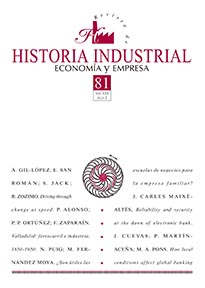Are business schools useful for family businesses? IESE’s influence on three significant Spanish firms
DOI:
https://doi.org/10.1344/rhi.v30i81.31568Keywords:
Business schools, family business, Spain, 20th century, organizational changeAbstract
This article deals with the long-term impact of business schools on the organizational and growth strategies of their client-firms. Although it is crucial to understand the global influence of business schools, this issue has been rarely approached from a historical perspective. Our research focuses on the relationship developed between the Instituto de Estudios Superiores de la Empresa (IESE) and the family firms Salvat, Puig, and Lladró through their professor-consultants and student-clients from 1958 to the 1990s. This analysis allows, first, to identify the exogenous and endogenous forces participating in the making of IESE, a world-leading business school in the 21st century. Second, we show that IESE’s early executive education programs provided expert knowledge, consulting services, and networks that amplified the school’s influence in the long-term development of its client firms. Third, we explain the engagementof IESE and some of its associated firms in the worldwide academic legitimation of family business studies that took place from the 1980s onwards.
Downloads
Downloads
Published
How to Cite
Issue
Section
License
The author assigns all rights to the publisher. Creative Commons
The author who publishes in this journal agrees to the following terms:
- The author assigns all intellectual property rights exclusively to the publisher for the entire duration of the applicable intellectual property rights.
- The publisher will distribute the texts under the Creative Commons Attribution License, which allows others to share the work, provided that they acknowledge the authorship, its initial publication in this journal, and the conditions of the license.





